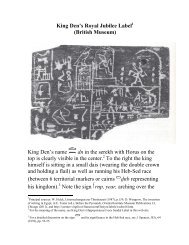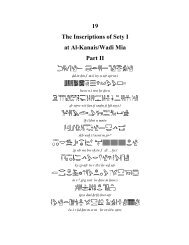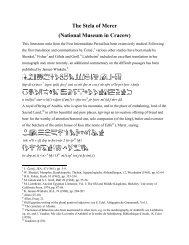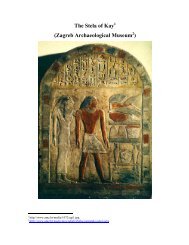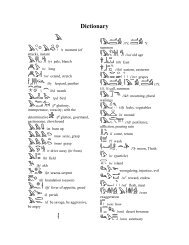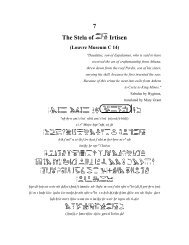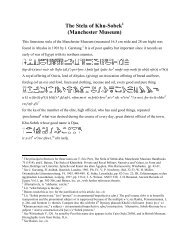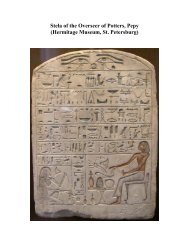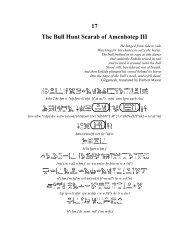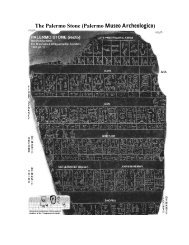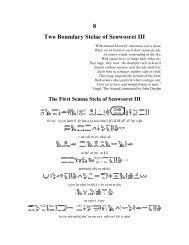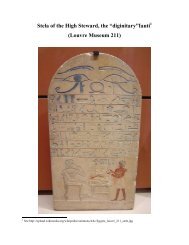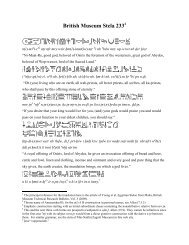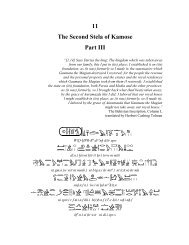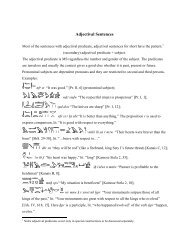15 The Poetical Stela of Thutmose III - Middle Egyptian Grammar
15 The Poetical Stela of Thutmose III - Middle Egyptian Grammar
15 The Poetical Stela of Thutmose III - Middle Egyptian Grammar
You also want an ePaper? Increase the reach of your titles
YUMPU automatically turns print PDFs into web optimized ePapers that Google loves.
<strong>15</strong><br />
<strong>The</strong> <strong>Poetical</strong> <strong>Stela</strong> <strong>of</strong> <strong>Thutmose</strong> <strong>III</strong><br />
Cairo Museum 34010<br />
Part I<br />
Prologue<br />
Dd-mdw in imn-ranb nswt tAwi<br />
ii.ti n.i Ha.ti n mA nfr(w).i zA.i nDti.i MN-#PR-Ra anx(.w) Dt<br />
wbn.i n mrwt.k ib.i Aw(.w) m iww.k nfrw r r-pr.i<br />
Xnm awi(.i) Haw.k m zA anx<br />
nDmwi imAt.k r Snbt.i<br />
smn.i tw m iwnn.i by.i n.k<br />
di.i n.k qnt nxt r xAswt nbt<br />
“In war: Resolution;<br />
In defeat: Defiance;<br />
In victory: Magnanimity;<br />
In peace: Goodwill.”<br />
Sir Winston Churchill,<br />
<strong>The</strong> Second World War
di.i bAw.k snD(w).k m tAw nbw<br />
Hryt.k r Drw zxnwt 4 nt pt<br />
saAy.i SfSft.k m Xwt nbt<br />
di.i hmhmt Hm.k xt pDt 9<br />
wrw xAswt nbt dmd m xfa.k<br />
Awy.i awi.i Ds.i nwH.i n.k st<br />
dmA.i iwntiw sti m Dbaw xAw mHtiw m Hfnw m zqr-anx<br />
di.i xr rxyw.k Xr Tbti.k titi.k Sntyw.k XAkw-ib<br />
mi wD.i n.k tA m Aw.f wsx.f imntiw iAbtiw Xr st-Hr.k<br />
xnd.k xAswt nbt ib.k Aw<br />
nn wn Hsi sw m hAw Hm.k ti (w)i m sSmy.k spr.k r.sn<br />
DA.n.k mw pXr wr nhrn m nxt m wsr wD.n.i n.k<br />
sDm.sn hmhmwt.k aq m bAbAw
gA.n.i fndw.sn m TAw n anx di.i nrw nw Hm.k xt ibw.sn<br />
Axt.i imt tp.k sswn.s st<br />
ir.s iz-HAq m nbdw-qdw<br />
Am.s imiw nbwt.sn m nswt.s<br />
dn.s tpw aAmw nn nhw.sn<br />
xr mss n sxmw.s<br />
di.i pXr nxtw.k m tAw nbw sHDt tpt.i m nDt(i).k<br />
nn xpr bSt(w).k r Snnt pt iw.sn Xr inw Hr psdw.sn<br />
m ksw n Hm.k mi wD.i<br />
di.i b(A)gi tkkw iww m hAw.k<br />
mAX n ibw.sn Haw.sn sdA.w(i)
<strong>The</strong> <strong>Poetical</strong> <strong>Stela</strong> <strong>of</strong> <strong>Thutmose</strong> <strong>III</strong>: Part I<br />
Dd-mdw recitation<br />
imn(w) Amun<br />
nst seat, throne<br />
Hai become excited, aroused<br />
wbn rise, shine<br />
r-pr temple, chapel, shrine<br />
Xnm (transitive) join, unite;<br />
(intransitive) be united, Xnm m<br />
associated/ endowed with<br />
, zA, zAw protection<br />
nDm (adjective-verb) sweet<br />
imAt grace, charm<br />
Snbt breast<br />
iwnn sanctuary<br />
biAi, by<br />
wonder, marvel<br />
magnify<br />
qnt valor, power<br />
, nxt victory<br />
bAw might, impressiveness<br />
snDw (noun) fear<br />
Hryt terror, dread<br />
zxnt support, column, pillar<br />
saAi make great, increase,<br />
SfSft respect, awe<br />
Vocabulary<br />
battle cry<br />
total, sum<br />
pDt bow<br />
iwnt bow<br />
hmhmt roaring,<br />
dmDi/dmdi unite, gather,<br />
xfa grasp<br />
Awi extend, stretch<br />
nwH rope<br />
nwH bind (enemies)<br />
dmA bind together<br />
iwnti desert bowman<br />
sTi/sti Nubian<br />
prisoner <strong>of</strong> war<br />
sqr smite, strike down<br />
Dba ten-thousand<br />
xA thousand<br />
sqr-anx<br />
rq incline, turn aside, defy<br />
Tbt sandal<br />
rxw opponent<br />
, / titi/TiTi<br />
crush, trample down<br />
Snty foe (<strong>of</strong> the king)
HAk truncate<br />
XAk-ib estranged<br />
wD command, assign, bestow,<br />
ordain, decree<br />
iAbt East<br />
iAbti eastern, easterner<br />
imnt West<br />
imnti western, westerner<br />
st-Hr supervision, control,<br />
command<br />
trample down<br />
xnd trod, step on,<br />
Hsi turn back; Hsi m face<br />
(aggressively)<br />
hAw vicinity, area<br />
sSmw guide, leader<br />
spr arrive, attain<br />
DAi ferry, cross (water)<br />
pXr turn, go around<br />
nhrn Naharin (Mesopotamia)<br />
nxt victory<br />
wsr power, might<br />
aq enter<br />
bAbA hole, hiding place<br />
, gAw<br />
(adjective-verb) narrow, constricted,<br />
lack; (transitive verb) deprive (m <strong>of</strong>);<br />
(noun) absence, lack<br />
, fnd nose<br />
TAw air, wind, breath<br />
dread<br />
nri fear<br />
nrw (noun) fear,<br />
Axt uraeus-serpent<br />
sswn destroy, (noun)<br />
destruction<br />
plunder<br />
iz-HAq (noun)<br />
nbdw-qd<br />
(plural noun) evil <strong>of</strong> character, enemies<br />
<strong>of</strong> Egypt<br />
qdw shape,form, manner,<br />
character<br />
stick<br />
through<br />
strength<br />
Am burn up<br />
nswt flame<br />
dn cut <strong>of</strong>f (head)<br />
aAm Asiatic<br />
mss totter<br />
amaAt throw-<br />
sxmw power, might<br />
pXr go around, course<br />
nxtw victory, valor,<br />
sHD gleam, brighten<br />
tpt uraeus<br />
bStw rebellion<br />
Sni encircle<br />
inw produce, products<br />
psDw back, spine
verb) weary, lazy<br />
ksw bowing<br />
bAgi (adjective-<br />
tkkw attackers<br />
mAX burn<br />
sdA tremble
<strong>The</strong> <strong>Poetical</strong> <strong>Stela</strong> <strong>of</strong> <strong>Thutmose</strong> <strong>III</strong>: Part I<br />
<strong>Grammar</strong> Points<br />
Prologue<br />
Dd-mdw in imn-ranb nswt tAwi<br />
Dd-mdw with the infinitive <strong>of</strong> Dd is a very common heading. It introduces the speaker<br />
imn-ra “Amun-Re” who asserts his support <strong>of</strong> <strong>Thutmose</strong> <strong>III</strong> in creating the “Empire,” the<br />
dominance <strong>of</strong> Egypt over the world known to them. This stela was erected at Karnak after<br />
<strong>Thutmose</strong> <strong>III</strong> achieved this goal. Dd-mdw, lit. “speaking words” can be translated many<br />
ways (or can be left un-translated), including “recitation,” “speech <strong>of</strong>,” etc. <strong>The</strong> epithet<br />
nb nswt tAwi “lord <strong>of</strong> the thrones <strong>of</strong> the Two Lands” emphasizes that it is Amun-Re who<br />
provides authority to the king to rule over Egypt.<br />
ii.ti n.i Ha.ti n mA nfr(w).i zA.i nDti.i<br />
MN-#PR-Ra anx(.w) Dt<br />
Amun-Re speaks to the pharaoh using the statives <strong>of</strong> the verbs ii “come” and Hai “become<br />
aroused, excited.” <strong>The</strong> second-person suffix ti shows that they both express<br />
wish/command, and therefore can be translated as imperatives: ii.ti “welcome!” and Ha.ti<br />
as “be aroused/exulted!” Alternatively, according to Lichtheim, the statives should<br />
emphasize the state resulting from these actions, in particular, Ha.ti should be translated as<br />
“in joy.” <strong>The</strong> infinitive <strong>of</strong> the 2-ae-gem. verb mAA is the object <strong>of</strong> the preposition n, and it<br />
uses here the base stem mA. <strong>The</strong> noun nDti “savior” is derived from the verb nD “save,<br />
protect.” MN-#PR-Ra is the pharaoh’s throne name. <strong>The</strong> epithet anx(.w) Dt “alive forever”<br />
includes the stative <strong>of</strong> the verb anx “live,” and is typically placed after the king’s or<br />
queen’s name.
wbn.i n mrwt.k ib.i Aw(.w) m iww.k nfrw r r-pr.i<br />
<strong>The</strong> adverbial phrase n mrwt can be translated as “for the sake <strong>of</strong>,” lit. “for/through love.”<br />
Note also that, unlike the English possessive adjectives, mrwt.k may not only mean “love<br />
<strong>of</strong> yours” but also “love <strong>of</strong> you/your love.” In the first clause the theme <strong>of</strong> the sentence is<br />
wbn.i and the rheme is this prepositional phrase mrwt.k. This is because that Amun-Re<br />
shines is given, and what is important is that the god shines “through love <strong>of</strong> you.”<br />
<strong>The</strong>refore, the verb form <strong>of</strong> wbn is a nonattributive relative form used emphatically, and<br />
the emphasis is on the adverbial phrase. In English, a cleft sentence can bring out the<br />
emphasis: “It is through love <strong>of</strong> you that …”<br />
In the second clause the <strong>Egyptian</strong> idiom Awi ib “happy, exulted” in the subject-stative<br />
construction uses the adjective-verb Awi “long,” lit. “long <strong>of</strong> heart.” <strong>The</strong> object <strong>of</strong> the<br />
preposition m is the plural <strong>of</strong> the adjectival phrase iw.k nfr “your good coming” which<br />
itself includes the verbal noun iw “coming.” (iww.k cannot be a nonattributive relative<br />
form because it is clearly plural.) Finally, r-pr “temple, chapel, shrine” is one <strong>of</strong> the many<br />
phrases that can be obtained from r “mouth, utterance, spell, door.”<br />
Xnm awi(.i) Haw.k m zA anx<br />
Once again, the verb form <strong>of</strong> Xnm “endow/provide/associate” (used transitively) can be<br />
interpreted as a nonattributive relative form and the emphasis is on the adverbial phrase m<br />
zA anx meaning “It is protection and life that …” <strong>The</strong> object Haw “body” is, as usual, in<br />
plural and the flesh determinative is incorporated in the plural strokes.<br />
nDmwi imAt.k r Snbt.i<br />
<strong>The</strong> exclamatory adjectival sentence is indicated here by the masculine dual form <strong>of</strong> the<br />
adjective nDm “sweet.” is the usual spelling <strong>of</strong> imAt “grace, charm.”<br />
smn.i tw m iwnn.i by.i n.k<br />
di.i n.k qnt nxt r xAswt nbt
di.i bAw.k snD(w).k m tAw nbw<br />
Hryt.k r Drw zxnwt 4 nt pt<br />
Here and in many instances below, we encounter sDm.f verb forms with the same suffixed<br />
subject . In all these Amun-Re speaks to the pharaoh and his presence expressed by<br />
this suffix pronoun. In many instances, the verb itself is rdi and the verb form uses the<br />
base stem di. <strong>The</strong> only sDm.f forms that use this stem are the circumstantial/imperfective<br />
sDm.f and the prospective/subjunctive sDm.f. <strong>The</strong> most obvious choice for the verb form<br />
is the first because <strong>of</strong> the meaning <strong>of</strong> the imperfect (Amun-Re’s continual support <strong>of</strong> the<br />
pharaoh), and also because <strong>of</strong> its appearance in captions such as: …<br />
imnt …di.s anx wAs nb 1 (with Amun-Re replaced by Nanuet, and <strong>Thutmose</strong> <strong>III</strong> by<br />
Hatshepsut). On the other hand, some authors interpret the god’s speech as a prophecy,<br />
and consequently translate these sDm.f verb forms in future tense. This fits very well with<br />
the prospective/subjunctive sDm.f expressing future. Moreover, in general, the use <strong>of</strong> the<br />
first-person singular suffix pronoun in the prospective/subjunctive also expresses the<br />
actor’s intention.<br />
In what follows, without explicit mention, we will interpret these verb forms as<br />
circumstantial/imperfective sDm.f.<br />
With this note, the current passage poses no grammatical problems. by is a<br />
variant <strong>of</strong> biAi “wonder, marvel.” Note the different translations <strong>of</strong> the<br />
predicate di “give, set” in the next two clauses. In the last adverb clause using the<br />
preposition r, Amun-Re indicates that the “Empire” stretches to the “limits” <strong>of</strong> the entire<br />
(known) world. <strong>The</strong> alternative spelling <strong>of</strong> sxnt is zxnt “support, column,<br />
pillar,” and for graphical reasons, in the 4 pillars <strong>of</strong> heaven, the ideogram zxnt is<br />
repeated to designate the number 4.<br />
1 Lacau and Chevrier, Une chapelle d’Hatshepsout, 291 and pl. 14 (55).
saAy.i SfSft.k m Xwt nbt<br />
saAy is an alternative spelling <strong>of</strong> the caus. 3ae-inf. verb saAi<br />
“make great, increase, magnify.”<br />
di.i hmhmt Hm.k xt pDt 9<br />
<strong>The</strong> object <strong>of</strong> di “make” is the noun phrase hmhmt Hm.k with direct genitive, where<br />
hmhmt means “roaring, battle cry.” Alternatively, according to<br />
Lichtheim, hmhmt here means “fame, renown.” 2 <strong>The</strong> object <strong>of</strong> the preposition<br />
xt “throughout” is the “Nine Bows,” the traditional enemies <strong>of</strong> Egypt. <strong>The</strong>y usually<br />
included Asiatics and Nubians but their exact identity depended on the specific era.<br />
wrw xAswt nbt dmd m xfa.k<br />
In this sentence the absence <strong>of</strong> the subject indicates that dmDi/dmdi “gather,<br />
unite, total, sum” is passive. Due to its length, the object wrw xAswt nbt is topicalized.<br />
Here the adjective wr “great, elder, important” is used as a noun, and its plural means the<br />
“nobles, princes,” lit. “great ones.” This kind <strong>of</strong> topicalization is not uncommon.<br />
Awy.i awi.i Ds.i nwH.i n.k st<br />
Awy is an alternative spelling <strong>of</strong> the 3ae-inf. adjective-verb Awi<br />
“extend, stretch.” <strong>The</strong> 3-lit. verb nwH “bind (enemies)” is derived from<br />
the noun nwH “rope.” <strong>The</strong> pronoun st “them” refers to wrw in the previous<br />
sentence.<br />
dmA.i iwntiw sti m Dbaw xAw mHtiw m Hfnw m zqr-anx<br />
2 This opinion is based on a study by J. Spiegel, WZKM, 54 (1957).
<strong>The</strong> term iwntiw sti was discussed in Ahmose’s autobiography. <strong>The</strong> nisbe<br />
mHti “northern” used as a noun in plural designates “the men <strong>of</strong> the north” or “the<br />
northeners.” <strong>The</strong> noun phrase sqr-anx “prisoner <strong>of</strong> war,” lit. “(one) who is smitten alive,”<br />
was also treated in Ahmose’s autobiography.<br />
di.i xr rxyw.k Xr Tbti.k titi.k Sntyw.k XAkw-ib<br />
mi wD.i n.k tA m Aw.f wsx.f imntiw iAbtiw Xr st-Hr.k<br />
In the first clause the rdi sDm.f construction starts with the circumstantial/imperfective<br />
sDm.f <strong>of</strong> rdi and is followed by the prospective/subjunctive sDm.f <strong>of</strong> xr “fall” with<br />
causative meaning. <strong>The</strong> noun <strong>of</strong> agent rxw “opponent” is derived from<br />
the verb rq “incline, turn aside, defy,” and the plural has a peculiar spelling here<br />
rxyw (instead <strong>of</strong> rxww). <strong>The</strong> Nine Bows were <strong>of</strong>ten depicted on royal sandals<br />
(in the text Tbti is the feminine dual <strong>of</strong> Tbt “sandal” and it is better translated as<br />
“sole”) and footstools to symbolically express the king’s treading on Egypt’s enemies.<br />
In the second clause the verbal predicate titi or TiTi with either <strong>of</strong> the<br />
determinatives or means “crush, trample down.” It is in subjunctive to express<br />
result, and in the English translation “so that” can be inserted” in front <strong>of</strong> it. <strong>The</strong> passive<br />
participle <strong>of</strong> the verb HAk “truncate” is used in the <strong>Egyptian</strong> idiom<br />
XAk-ib “estranged,” lit. “(one) who is truncated <strong>of</strong> heart.”<br />
Instead <strong>of</strong> the principal meaning <strong>of</strong> wD “command” we should choose “assign, bestow.” It<br />
is a nonattributive perfective relative form governed by the preposition mi. <strong>The</strong> meaning<br />
<strong>of</strong> the <strong>Egyptian</strong> idiom m Aw.f wsx.f “in its length and breath” is “whole, entire.” <strong>The</strong><br />
subjects <strong>of</strong> the second adverb clause are plurals <strong>of</strong> two nisbes imnti “western”<br />
and iAbti “eastern” used as nouns: “easterner” and “westerner.” <strong>The</strong>se nisbes are
in turn derived from the nouns imnt “West” and iAbt “East.” <strong>The</strong><br />
<strong>Egyptian</strong> idiom st-Hr means “supervision, control, command.”<br />
xnd.k xAswt nbt ib.k Aw(.w)<br />
nn wn Hsi sw m hAw Hm.k ti (w)i m sSmy.k spr.k r.sn<br />
In the fist clause the verb xnd “trod, step on, trample down” is<br />
circumstantial/imperfective sDm.f. <strong>The</strong> following unmarked adverb clause contains a<br />
subject-stative construction which once more uses the <strong>Egyptian</strong> idiom Awi ib “happy,<br />
exulted.” In the third clause the negated indicative/perfective sDm.f construction nn wn<br />
involving the indicative/perfective <strong>of</strong> the verb wnn is a common way to express general<br />
negation <strong>of</strong> existence “there is not,” “there does not exists.” <strong>The</strong> usual meaning <strong>of</strong> the<br />
verb Hsi with the preposition m means “face (aggressively).” <strong>The</strong> verb form is<br />
imperfective active participle, and it is indicated by the double stokes.<br />
<strong>The</strong> infrequently used particle ti always introduces an adverb clause which is subordinate<br />
to the following main clause. <strong>The</strong> subordinate clause in question is an adverbial sentence<br />
<strong>of</strong> identity (m <strong>of</strong> predication). <strong>The</strong> more frequent alternative spelling <strong>of</strong><br />
sSmy is sSmw, a participle/noun <strong>of</strong> agent, and it identifies Amun-Re as a<br />
guide/leader <strong>of</strong> <strong>Thutmose</strong> <strong>III</strong>. <strong>The</strong> circumstantial/imperfective sDm.f verbal predicate <strong>of</strong><br />
the main clause spr with the preposition r needs to be translated to match the<br />
context: “attain, overwhelm” are fitting choices.<br />
DA.n.k mw pXr wr nhrn m nxt m wsr wD.n.i n.k<br />
In the narrative the predicate suddenly turns into circumstantial sDm.n.f /perfect, and for<br />
the transitive verb DAi “ferry across, cross” this not only means a completed action but<br />
action in the past.<br />
<strong>The</strong> intestine ideogram is suggestive to the meaning <strong>of</strong> the verb pXr “turn, go around.” It<br />
is a participle here, and the “great water that goes around/the great turning water” is the
winding Euphrates. In a similar vein, nhrn “Naharin” is ancient Mesopotamia, the land<br />
between the Euphrates and Tigris rivers. <strong>The</strong> perfect relative form <strong>of</strong> wD “ordain, decree”<br />
once again reminds the pharaoh that the success <strong>of</strong> these military feats is due to the<br />
support <strong>of</strong> Amun-Re.<br />
sDm.sn hmhmwt.k aq m bAbAw<br />
<strong>The</strong> initial adverb clause “when they hear…” contains the nonattributive perfective<br />
relative form <strong>of</strong> the verb sDm. <strong>The</strong> verbal predicate aq “enter” <strong>of</strong> the following main<br />
clause expresses result so that it is prospective/subjunctive sDm.f. It inherits the<br />
(suppressed) subject.<br />
gA.n.i fndw.sn m TAw n anx di.i nrw nw Hm.k xt ibw.sn<br />
<strong>The</strong> first clause starts with , a variant spelling <strong>of</strong> gAw “lack.” Used<br />
with the preposition m it means “deprive <strong>of</strong>.” <strong>The</strong> verb form is circumstantial sDm.n.f<br />
/perfect, and the strict word order requires the object fndw.sn to follow. <strong>The</strong> indirect<br />
genitive TAw n anx in the adverbial phrase is typical and self-explanatory: “breath <strong>of</strong> life.”<br />
<strong>The</strong> next clasue once again starts with the circumstantial/imperfective sDm.f : di.i, and the<br />
abstract noun nrw “fear” is doubtless derived from the verb nri “fear.” <strong>The</strong><br />
plural genitival adjective nw is fooled by this false plural.<br />
Axt.i imt tp.k sswn.s st<br />
ir.s iz-HAq m nbdw-qdw<br />
Am.s imiw nbwt.sn m nswt.s<br />
dn.s tpw aAmw nn nhw.sn
xr mss n sxmw.s<br />
<strong>The</strong> first four lines <strong>of</strong> this passage use the noun + circumstantial sDm.f /subjectimperfective<br />
construction with a single topicalized subject Axt.i imt tp.k. <strong>The</strong> goddess<br />
determinative is suggestive <strong>of</strong> the meaning <strong>of</strong> Axt “(the) uraeus-serpent,” one <strong>of</strong> the<br />
protective goddesses worn on the pharaoh’s forehead. <strong>The</strong> subject also involves the<br />
feminine form <strong>of</strong> the prepositional nisbe imi lit. “which is on/in.” By construction, these<br />
clauses express the imperfect. <strong>The</strong> predicates are the causative verb sswn “destroy,” and<br />
the verbs iri “make,” Am “burn up, consume,” and dn “cut <strong>of</strong>f.” <strong>The</strong> feminine suffix<br />
pronoun refers to the ureaus-serpent. <strong>The</strong> literal meaning <strong>of</strong> the military expression iz-HAq<br />
“go and plunder” as a noun means here “plunder, devastation.” <strong>The</strong> plural noun nbdwqdw<br />
is a nfr Hr construction, lit. the plural <strong>of</strong> “evil <strong>of</strong> character,” and it generally refers to<br />
the enemies <strong>of</strong> Egypt. Note that from the 11 th Dynasty onwards the nw-pot determinative<br />
in qdw “shape, form, manner, character” is <strong>of</strong>ten replaced by . In addition, in<br />
nbdw-qdw the plural strokes are replaced by the “foreigner” determinatives.<br />
In the phrase imiw nbwt the sign is a variant <strong>of</strong> nbt and so its plural is nbwt.<br />
According to J. Vercoutter, it designates marshy areas in the north/east. <strong>The</strong> phrase itself<br />
therefore can be translated as “(those) who are in the marshy areas <strong>of</strong> the north/east.”<br />
Lichtheim translates this as the “lowlanders” as opposed to imiw iww “islanders,” lit.<br />
“(those) who are in the islands” (cf. “<strong>The</strong> Poem” in the next chapter). <strong>The</strong> throw-stick<br />
amaAt frequently occurs (usually) as a determinative to all<br />
foreign peoples. In aAm “Asiatic” it generally designates an inhabitant <strong>of</strong><br />
Syria-Palestine. In the clause nn A the noun phrase A has a suffix pronoun that refers to<br />
the enemies <strong>of</strong> Egypt in general. <strong>The</strong>refore the negative particle nn can be translated as<br />
“without.” <strong>The</strong> literal meaning <strong>of</strong> the whole phrase nn nhw.sn is “without a loss <strong>of</strong> them,”<br />
and it clearly indicates that none <strong>of</strong> them were able to escape their fate.<br />
<strong>The</strong> introductory particle xr here is a statement auxiliary and signals inevitable<br />
consequence/necessity expressed by the circumstantial/imperfective sDm.f <strong>of</strong> the verb mss
“totter” (with the suppressed subject aAmw). Written out, it should be xr.sn mss aAmw n<br />
sxmw.s. <strong>The</strong> preposition n here should be translated as “because <strong>of</strong>.”<br />
di.i pXr nxtw.k m tAw nbw sHDt tpt.i m nDt(i).k<br />
nn xpr bSt(w).k r Snnt pt iw.sn Xr inw Hr psdw.sn<br />
m ksw n Hm.k mi wD.i<br />
<strong>The</strong> rdi + prospective/subjunctive sDm.f construction with the verb pXr “go around,<br />
course through, encompass” in the prospective/subjunctive starts this passage. <strong>The</strong><br />
second clause is an adverbial sentence <strong>of</strong> identity. <strong>The</strong> subject is the direct genitive sHD<br />
tpt.i with the infinitive <strong>of</strong> the caus. 2-lit. verb sHD “gleam, brighten” used as a noun. <strong>The</strong><br />
predicate is the adverbial phrase m nDt.k with the verbal noun nDt(i) “savior, protection.”<br />
(Note that the infinitive <strong>of</strong> the 2-lit. verb nD “save, protect” uses the base stem.)<br />
<strong>The</strong> independent sentence that follows that uses the nn + prospective/subjunctive sDm.f<br />
construction with future meaning: “will not become.” <strong>The</strong> following phrase employs the<br />
(feminine) imperfective relative form <strong>of</strong> the verb Sni “encircle.” In the next clause the<br />
verb iw is again circumstantial/imperfective sDm.f and the following adverbial phrases<br />
depict a typical scene <strong>of</strong> the foreigners carrying tributes on their backs bowing to the<br />
pharaoh. Finally, the prepositional phrase m ksw “(in) bowing” uses the verbal noun ksw<br />
(not the infinitive <strong>of</strong> the 3-ae-inf. verb ksi “bow”). <strong>The</strong> phrase mi wD.i has been discussed<br />
above.<br />
di.i b(A)gi tkkw iww m hAw.k<br />
mAX n ibw.sn Haw.sn sdA.w(i)<br />
This passage poses no grammatical problems. <strong>The</strong> second (noun) clause uses the (plural)<br />
perfective active participle <strong>of</strong> iw “come.”
mAX “burn” is in the infinitive used as a noun. <strong>The</strong> last clause has a subject-stative<br />
construction, where the 3PL <strong>of</strong> the stative <strong>of</strong> the verb sdA “tremble” is written with extra<br />
plural strokes.



